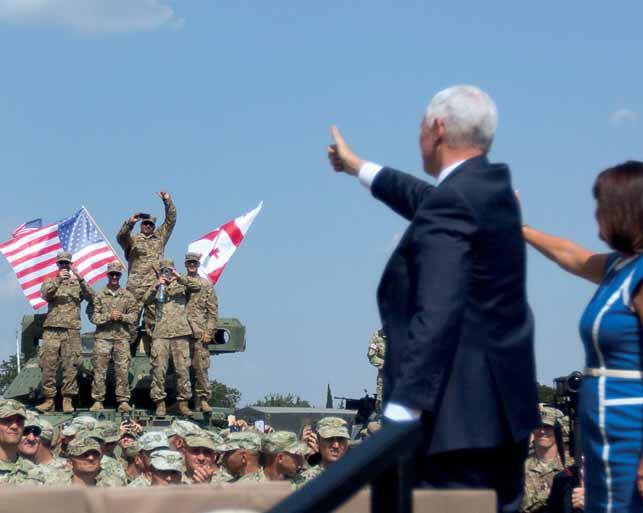4
POLITICS
GEORGIA TODAY
APRIL 2 - 8, 2021
Georgia and Its Main Strategic Partner: Marking New Principles in Relations? Part 1 more acceptable to the reader as well. In addition, this assessment of the State Department and White House will allow us to see the picture from the Georgian side better and to analyze it rationally. This approach will be at least an initial attempt for further, more extensive analysis and implementation of theoretical theses in practice. Most importantly, such observation or analysis should become a constant objective for the relevant services and research circles in Georgia. It must also build a credible bridge to translate analytical assessments and conclusions into qualified policy decisions.
ANALYSIS BY VICTOR KIPIANI, CHAIRMAN, GEOCASE
E
nough time has elapsed since the inauguration of President Joe Biden in the United States to express certain opinions. Clearly, these views cannot be categorical. The reasons for such caution in assessments can be split into two: first, a period of several months is not a sufficient basis for drawing conclusions; and second, a radical change in the foreign policy of a country like the United States requires much more time and even more effort (not to mention the objective or subjective constraints that hinder noticeable changes or make them almost impossible). We have already extensively discussed the possibility of a qualitative realignment of the foreign policy vector by the new White House Administration in previous publications. Thus, a reader can learn about our views on those issues in those articles if interested. Despite the above, virtually every newly elected ruling power in every country, within a few months of coming to power, is characterized by its own signature. It is exactly during this period that the old domestic and foreign policy agendas are revised, new ones are brought forward, and practical steps are planned. Planning, for the most part, manifests itself in the recruitment of new staff from various parts of the executive branch, which also gives some insight into future actions. Furthermore – especially in the case of the United States – several statements are made selectively, a specially prepared word is uttered, and the socalled Policy Paper is published, which provides additional information on the attitude of the new government towards on-going issues.
WITH OR WITHOUT A "GRAND STRATEGY"?
Vice President Mike Pence in Tbilisi, in 2017. Official White House photo by D. Myles Cullen
down, the quality of analytics falls, the decision-making process is damaged, and, consequently, the state interest of Georgia is also damaged. In general, this problem needs to be discussed in more detail, especially concerning the example of very specific state institutions. However, we should not get carried away and for now return to the main point of this article.
A REMINDER OF WHAT WE ALREADY SEEM TO KNOW
WHAT WE SHOULD EXPECT
There are several countries in the world today whose study of foreign policy documents or other materials should be a constant priority for us. However, it is unfortunate that not all are given equal attention in this regard, and some may indeed find themselves beyond how much they should get. For example, we rarely come across a qualified assessment of such topical Russian issues. However, perhaps this is not at all so surprising bearing in mind the stigma attached to any interest towards Russia in the community and the threats posed by that interest at one time in the past. Also, the depth of research on the current processes in the Middle East leaves the impression of insufficiency in this regard, which raises questions considering that the region is in Georgia's immediate neighborhood, with more geopolitical influence than many Georgians can imagine. This list can be expanded, however, in our opinion, virtually all significant political spaces are connected together by a single shortcoming: The inadequate attitude towards in-depth study and analysis by the official and, in some cases, civil analytical circles of Georgia. In this respect, the public sector is probably relatively proactive, although this relative advantage is immediately nullified as soon as the "self-isolation" of official channels occurs and they display inadmissibility of the opinions or evaluations generated beyond them. Eventually, the process of conceptualization is slowed
We mentioned above the need to observe the countries that are particularly important for Georgia's foreign and domestic positioning. We noted the necessity for timely, correct processing of the information obtained as a result of these observations and filtered evaluations through the "oven" of decisions. Reconciling all levels of this unified technology of intellect and politics is especially important when any mistake or misinterpretation can have dire or even irreparable consequences for your homeland. Therefore, it is perfectly natural for the US domestic political current or its entrances to the global arena to attract the special attention of official and public circles in Georgia. Since the independence of Georgia, the United States has made a special contribution to the development and prosperity of the Georgian state, and it continues to do so in present days. Moreover, the role of the United States, recognized by us as a key strategic partner and ally, will remain so in the foreseeable future. Clearly, the content of the relationship may change under the influence of a global and regional context. But, also, in practice, there is no doubt that in the face of the next few decades, our bilateral relationship must be filled with new elements. It should be filled provided that the parties have a real will and the resources to develop a partnership with both changing realities and changing circumstances while maintaining their ability to adapt ade-
quately. The past few years have completely changed the foreign policy, geo-economic, and security dynamics. At the same time, it is noteworthy that even this period allows the distinction of individual stages within itself. One such undeniable milestone was Donald Trump's presidency, during which a number of global challenges were assessed quite differently – in some cases the assessments were fair and, in some others, quite arguable. However, the fact is that several politically and intellectually unresolved issues have been stirred up, their re-evaluation has begun, and several problems have paved the path for quite different resolutions. Trump's presidency is over (although, Trumpism is not over yet), and the new White House resident, while still campaigning, outlined several aspects of US foreign policy that are directly related to Georgia's future and can directly shape the regional picture. During the election, the marked novelties got way more highlighted first during President Biden's visit to the State Department and then during his speech at the recent Munich Security Conference. These two events logically attracted the attention of the Georgian audience to get a more accurate answer to two very specific questions: First, what would be the position of the Biden Administration towards the Black Sea region and, presumably, Georgia? And second, how should we act to further deepen American interest in the Georgian agenda? Bringing more clarity to these issues became even more urgent when Trump's approach was replaced by Biden's, and any gains from the past Georgian-American partnership required a new guide. Such novelty was led by the coincidence of several key elements, namely the current dramatic social process in the US, the need to redefine the Western security model, and the growing active interest of several regional leaders at the expense
of Western interests in the Black and Caspian Sea macro-regions. We are facing a regional situation, which as per one of the top officials of the US State Department, is practically equivalent to a "geopolitical earthquake". Irrespective of whether this comparison is correct or not, it is a fact that the regional dynamics of recent years have not changed for the benefit of Georgia and its key strategic partner. This requires a joint, decisive, and timely effort to overcome the status quo that has already been created – as well as to deal with the (inevitable?) future “aftershocks”, which are typical for earthquakes. From this perspective (and in view of the historical crossroads so relevant for Georgians), it is necessary to know what the guiding principles of the foreign policy of our main strategic partner and ally are and what conceptual and strategic implications on which the White House Administration and its State Department will rely. It is essential to have an answer to the question we have already raised: What should we expect from the West in this difficult region and what might be the concrete result of this expectation? It is quite understandable that this and other related issues are not just in the field of intellectual exercise. The answers to them and the response based on the answers are directly related to the coherency of Georgia as an international legal entity, its functionality, and the future perspective of Georgian statehood. To raise a certain awareness around emerging issues, we will use two documents: one is US Secretary of State Anthony Blinken's, A Foreign Policy for the American People, and the other is the White House Interim National Security Strategic Guidance, both dated March 3 this year. In order to better summarize them, we decided to merge the content of both documents. This way we can better comment on specific aspects. This approach in terms of apprehension is
We do not formulate the question in this way by chance. We have already noticed that the era of linear and strictly regimented "strategy" is a thing of the past and it has been replaced by a more flexible, dynamic, so-called emerging strategy. The reason for this is on the surface: A rapidly changing world where the depth, pace, and content of change in most cases cannot be predicted. Hence, the so-called hard big strategies have lost their purpose, the practical value of which was more suited to the static confrontation between the two opposite camps during the Cold War. In the modern world, in the face of the need for leader states to adapt to rapidly changing circumstances without ideology, the attachment of the executive branch to the policy document of the "Grand Strategy" can turn out to be counterproductive only. Thus, the space for operative response to events is limited, the decision-making and implementation quality decreases, and the management of national policy becomes constrained. At this stage, the document prepared by the White House was called “interim”. This is quite understandable as the final document is still being prepared. However, it is likely that the final strategic document will retain the same, high degree of flexibility (some may even disapprove its "amorphousness"). In practical terms, this may prove that modern foreign policy, at the expense of shifting away from "values", further emphasizes pragmatic interests. In addition, the deviation from moral principles in the geopolitical line of any country can further be explained by "technical considerations" for protection of national and strategic interests. In the face of such reasoning, we inadvertently recall the words of Lord Palmerston: “We have no eternal allies, and we have no perpetual enemies. Our interests are eternal and perpetual, and those interests it is our duty to follow”. Consequently, such a blatant change in the rules of the game in the foreign arena should mean only one thing for Tbilisi: constant psychological readiness for change and the maximum concentration of political or other resources to respond to them properly. The world politics of such an environment does not need to be evaluated from the point of view of excessive morality. It is simply a matter of looking through the prism of your own national interests and devoting as much time and energy as possible for the systematic and rational – not “doctrinal” – pursuit of those interests. This is the reality the modern geopolitical landscape offers and we and our partners must face it. Continued in next week’s GT and online on georgiatoday.ge.



